The Intel Optane SSD 900p 480GB Review: Diving Deeper Into 3D XPoint
by Billy Tallis on December 15, 2017 12:15 PM ESTAnandTech Storage Bench - Light
Our Light storage test has relatively more sequential accesses and lower queue depths than The Destroyer or the Heavy test, and it's by far the shortest test overall. It's based largely on applications that aren't highly dependent on storage performance, so this is a test more of application launch times and file load times. This test can be seen as the sum of all the little delays in daily usage, but with the idle times trimmed to 25ms it takes less than half an hour to run. Details of the Light test can be found here. As with the ATSB Heavy test, this test is run with the drive both freshly erased and empty, and after filling the drive with sequential writes.
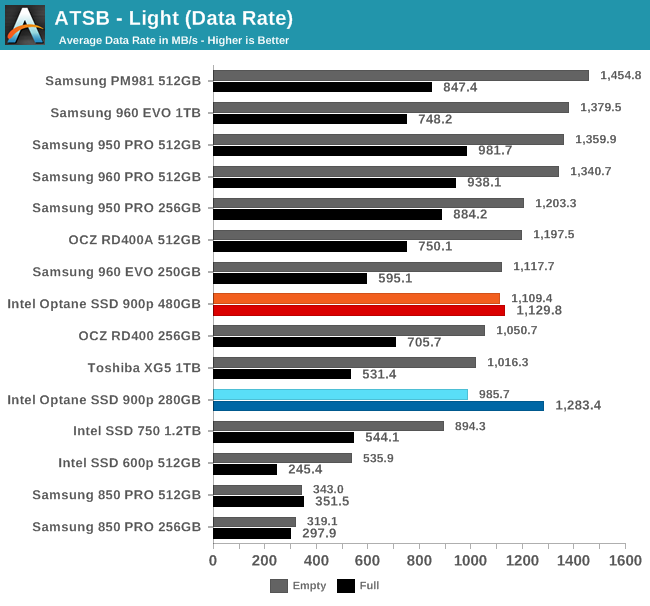
The Light test shows much greater differences between full and empty drive performance, for both flash SSDs and for the rather variable 280GB Optane SSD 900p. The 480GB model shows less variation in its average data rater between the full and empty runs. Overall, the Optane SSDs outperform a full flash-based SSD but are unimpressive compared to a fresh out of the box flash-based SSD.
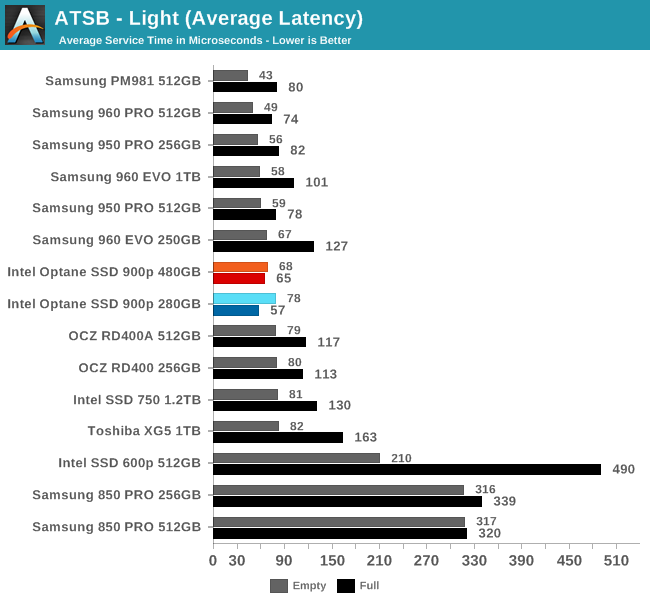
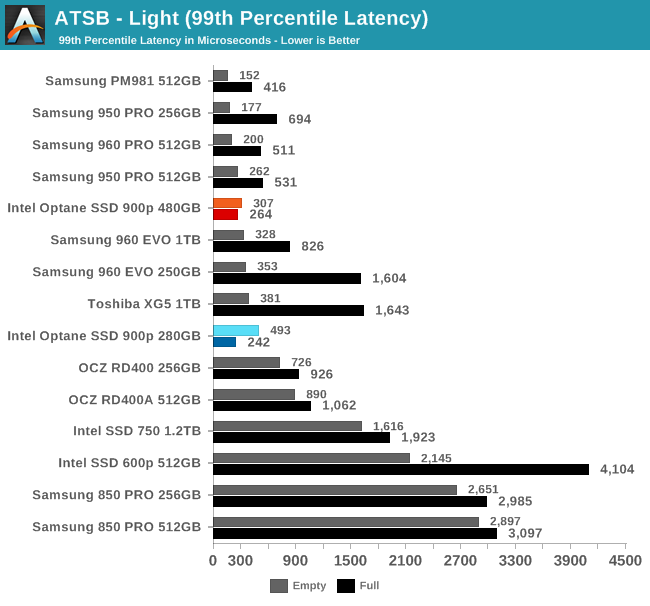
Aside from the different behavior of full vs empty, the average and 99th percentile latency scores of the Optane SSDs are not too interesting. The best-case performance is not quite as fast as the best from a flash based SSD, but once the flash drive is slowed down by being full, the Optane SSD shows a meaningful latency advantage.
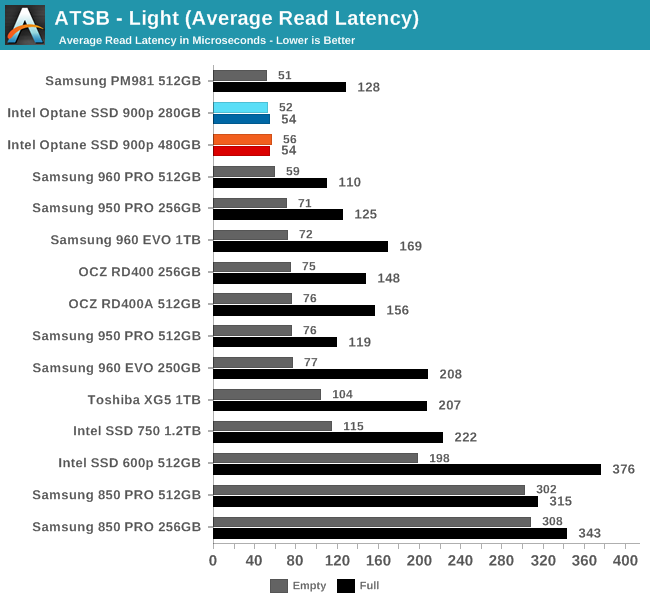
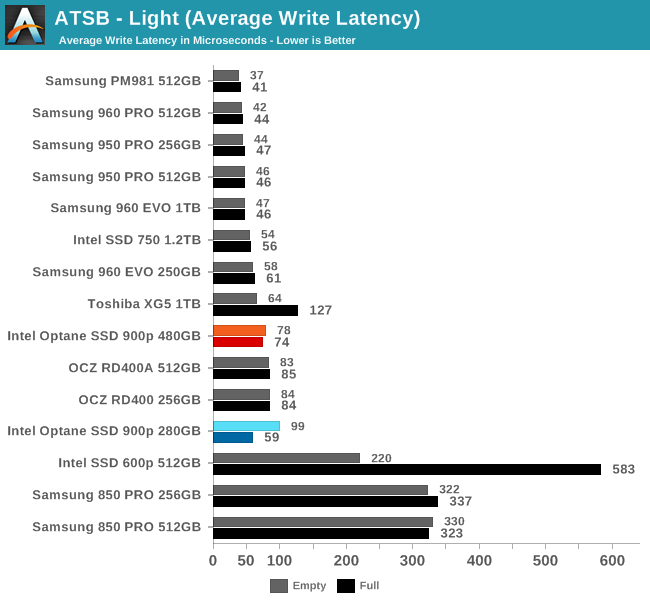
The average read latency of the Optane SSDs on the Light test is not hurt by filling the drive, giving it much better latency in the worst case scenario than any flash-based SSD. When the Light test is run on freshly-erased drives, the Optane SSD's average read latency is about the same as the best flash-based drives. Neither Optane SSD sets a record for average write latency, and Samsung's fastest NVMe drives have a clear advantage.
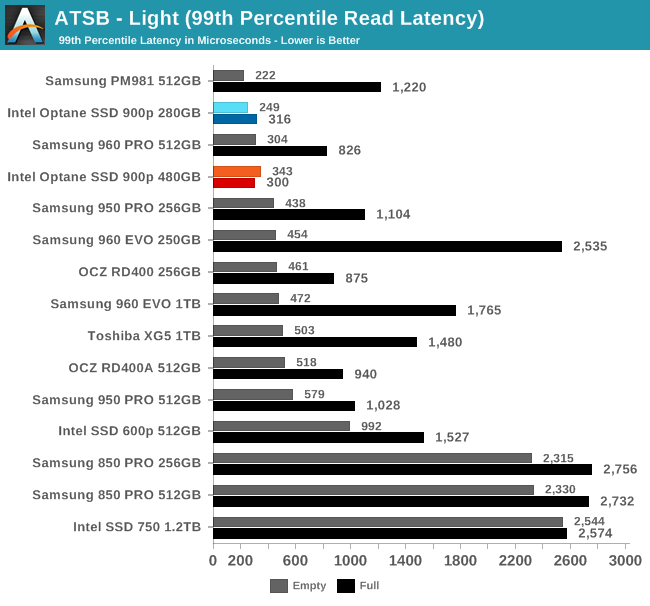
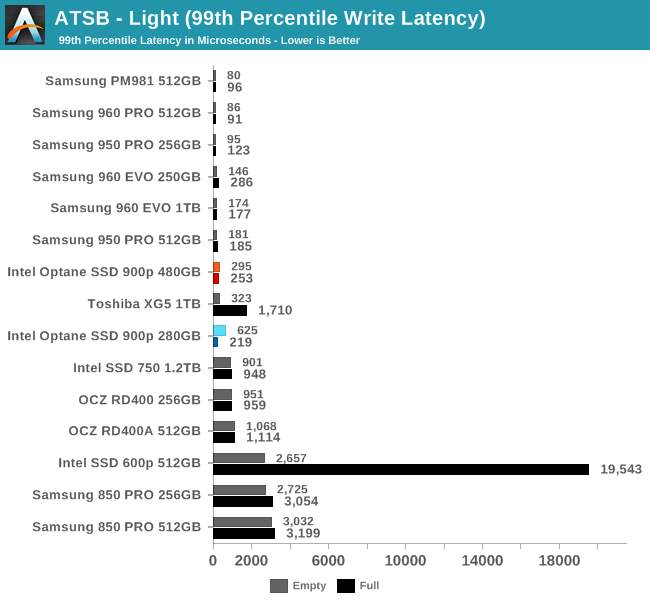
As with the average read latency, the 99th percentile read latency of the Optane SSDs on the Light test only impresses when compared to the performance of flash-based SSDs in unfavorable conditions like being completely full. Otherwise, the Samsung PM981 performs just as well, and the 960 PRO isn't far behind. The 99th percentile write latency of the Optane SSDs is clearly worse than Samsung's top NVMe SSDs.
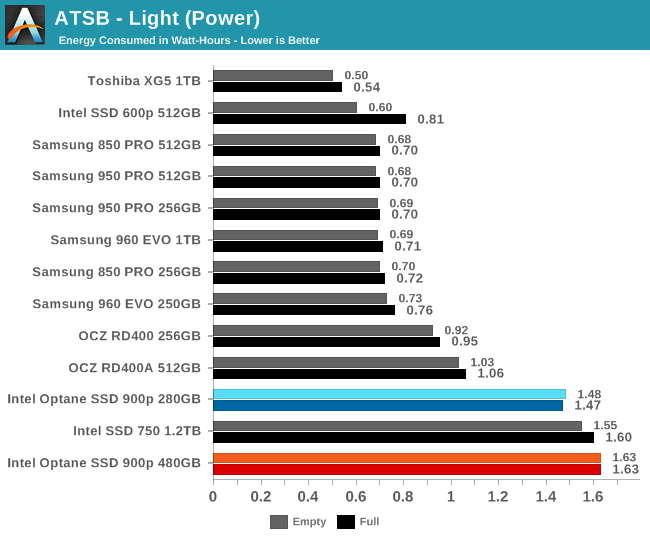
The Optane SSD 900p again requires much more energy than most NVMe SSDs, and the larger Optane drive requires significantly more power—three times as much as the most efficient NVMe SSD we've tested.










69 Comments
View All Comments
eddman - Sunday, December 17, 2017 - link
That graph explains the situation perfectly. Even if the media's latency was somehow magically reduced to zero, the total storage latency would still be only about 6 times better.It's all pointless though; ddriver's personal hatred towards intel and "the corporations" prevents him from thinking differently. As soon as he finds a number that is different from what was mentioned in the promotional materials, the first thing he does is to start shouting "liar, liar".
P.S. I have zero love for corporations and can't stand when one takes advantage of the users. What I also can't stand is a person spreading unsubstantiated claims and spamming a technology website's comment section to offload his hate in order to feel better.
tuxRoller - Friday, December 15, 2017 - link
Also z nand appears to be mlc cells operating in SLC mode, and that's still slower than first gen xpoint.hescominsoon - Friday, December 15, 2017 - link
Intel has walked back the 100x bs claims. Also notice how micro(their partner in this venture) has NOT released their side of this product?https://semiaccurate.com/?s=optane
tuxRoller - Saturday, December 16, 2017 - link
They walked them back? Maybe for these nvme products, though I've not seen anything about that. The real test is how well they'll do as direct addressed memory when used in the DIMM configuration.Reflex - Friday, December 15, 2017 - link
SLC has no significant advantages over Optane. Optane is nearly across the board a better performer, often by a significant margin, than any commercial NAND technology. The two drawbacks that are important right now are power consumption and cost (these are also drawbacks of SLC for the record)The complaints about Intel's 'hype' are misconstrued. There is a huge difference between discussing what a technology is capable of, and what individual products derived from that technology can deliver. That some people had reading comprehension problems is not Intel's problem, they are delivering what they promised, and as the rest of the supporting infrastructure improves over time we know based on their initial statements that Optane/PCM can scale to match it.
CheapSushi - Friday, December 15, 2017 - link
The industry is trying. It's called Z-NAND.ddriver - Friday, December 15, 2017 - link
Which is MLC...Samsung realized nobody is catching up in the nand market and decided to push consumer, high end and mainstream enterprise a notch down to TLC.
So now that MLC is only a "high end enterprise" thing in their portfolio, they decided to pimp it up with a new moniker - z-nand. Alas, it is just good old MLC with a barely incremental controller. And claim that it has anything to do with SLC performance - which it does as much as an a race horse harness makes an old donkey faster.
They REALLY aren't trying.
CheapSushi - Saturday, December 16, 2017 - link
It's MLC & TLC 3D NAND treated exactly like SLC (1 bit per cell) with a better controller and special sauce, effectively making it as if it was SLC in the first place and a better SLC driver than previous SLC drives that came out. So what is the issue? It's not a completely separate NAND production line?ddriver - Saturday, December 16, 2017 - link
Do you realize parroting nonsense you are clearly completely ignorant of doesn't win you bonus points?There is no such thing, you have to compromise one for the sake of the other. It is just more mature and a tiny bit better than previous gen MLC, but it is not even half of what can be squeezed of contemporary SLC.
"Special sauce"? It is sad to see average Joe hans't moved up a bit since the middle ages.
drajitshnew - Saturday, December 16, 2017 - link
No "ryzen" in opposition to their "core". The flash industry is in a race to see who can make the CHEAPEST PoS